Dementia: Neurology, Diagnosis, and Person-Centered Care
VerifiedAdded on 2023/01/17
|11
|3035
|95
Report
AI Summary
This report provides a comprehensive overview of dementia, covering its neurological basis, including causes such as Alzheimer's disease, vascular dementia, Lewy body dementia, and frontotemporal dementia. It explores various types of memory impairment, such as the inability to learn new information, poor judgment, and personality changes. The report also examines factors that can cause changes in an individual with dementia, including confusion, depression, and medical conditions. Furthermore, it discusses the impact of early diagnosis and the importance of recording signs and symptoms of dementia. The report emphasizes the need for a person-centered approach in dementia care, contrasting it with non-person-centered methods. It highlights how this approach considers an individual's needs and preferences to provide effective care and improve their quality of life. The report underscores the significance of diagnosis for individuals and their families.
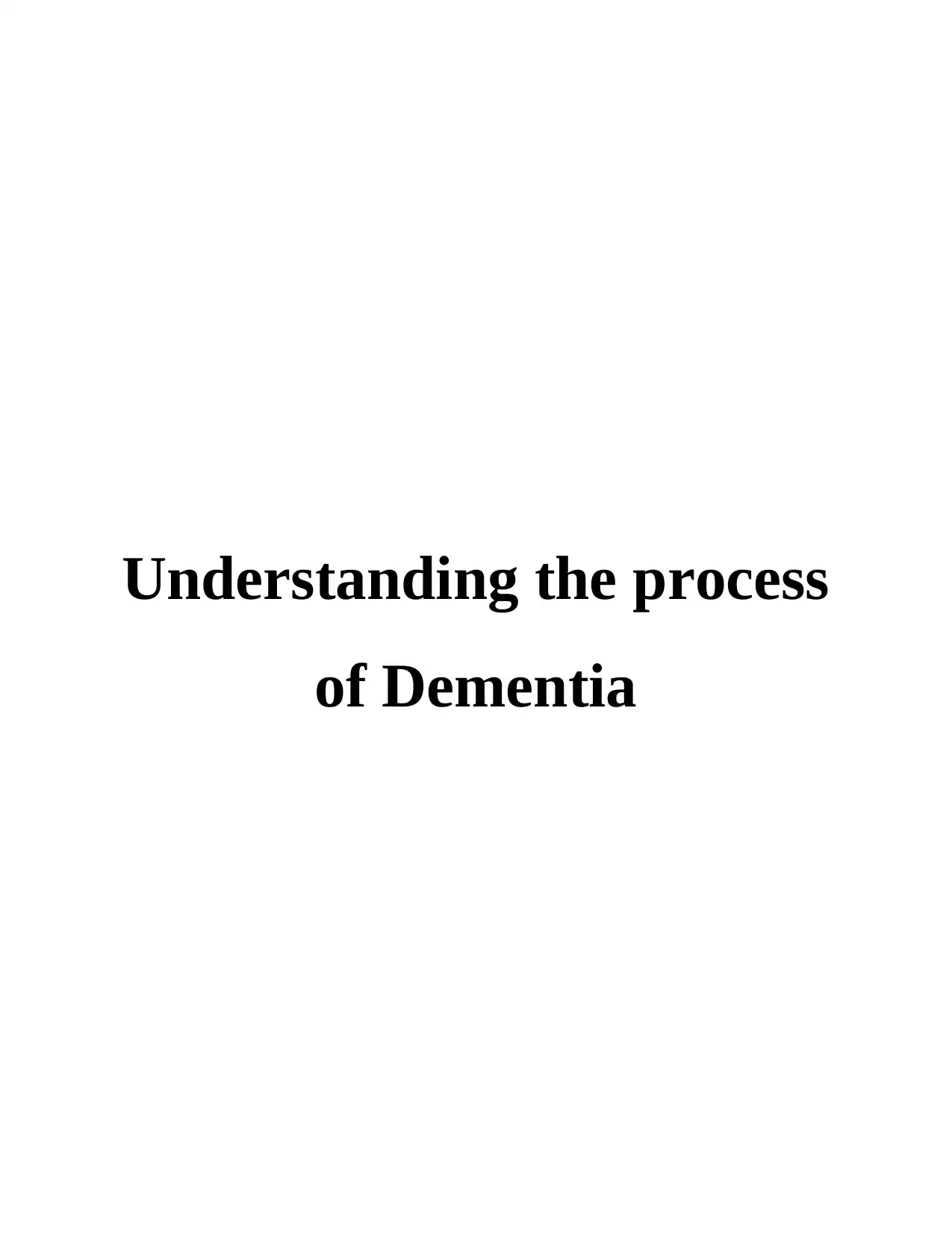
Understanding the process
of Dementia
of Dementia
Paraphrase This Document
Need a fresh take? Get an instant paraphrase of this document with our AI Paraphraser
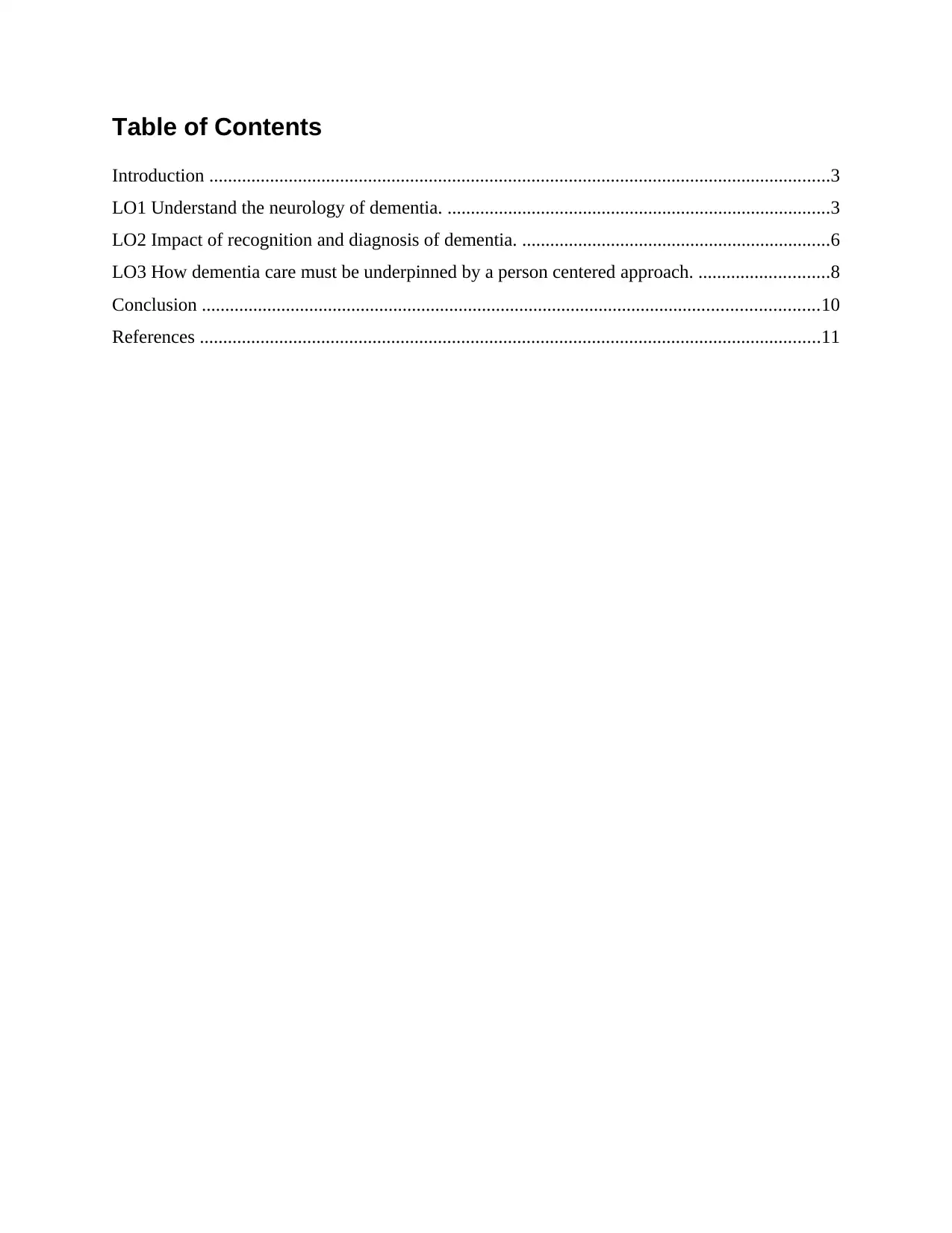
Table of Contents
Introduction .....................................................................................................................................3
LO1 Understand the neurology of dementia. ..................................................................................3
LO2 Impact of recognition and diagnosis of dementia. ..................................................................6
LO3 How dementia care must be underpinned by a person centered approach. ............................8
Conclusion ....................................................................................................................................10
References .....................................................................................................................................11
Introduction .....................................................................................................................................3
LO1 Understand the neurology of dementia. ..................................................................................3
LO2 Impact of recognition and diagnosis of dementia. ..................................................................6
LO3 How dementia care must be underpinned by a person centered approach. ............................8
Conclusion ....................................................................................................................................10
References .....................................................................................................................................11
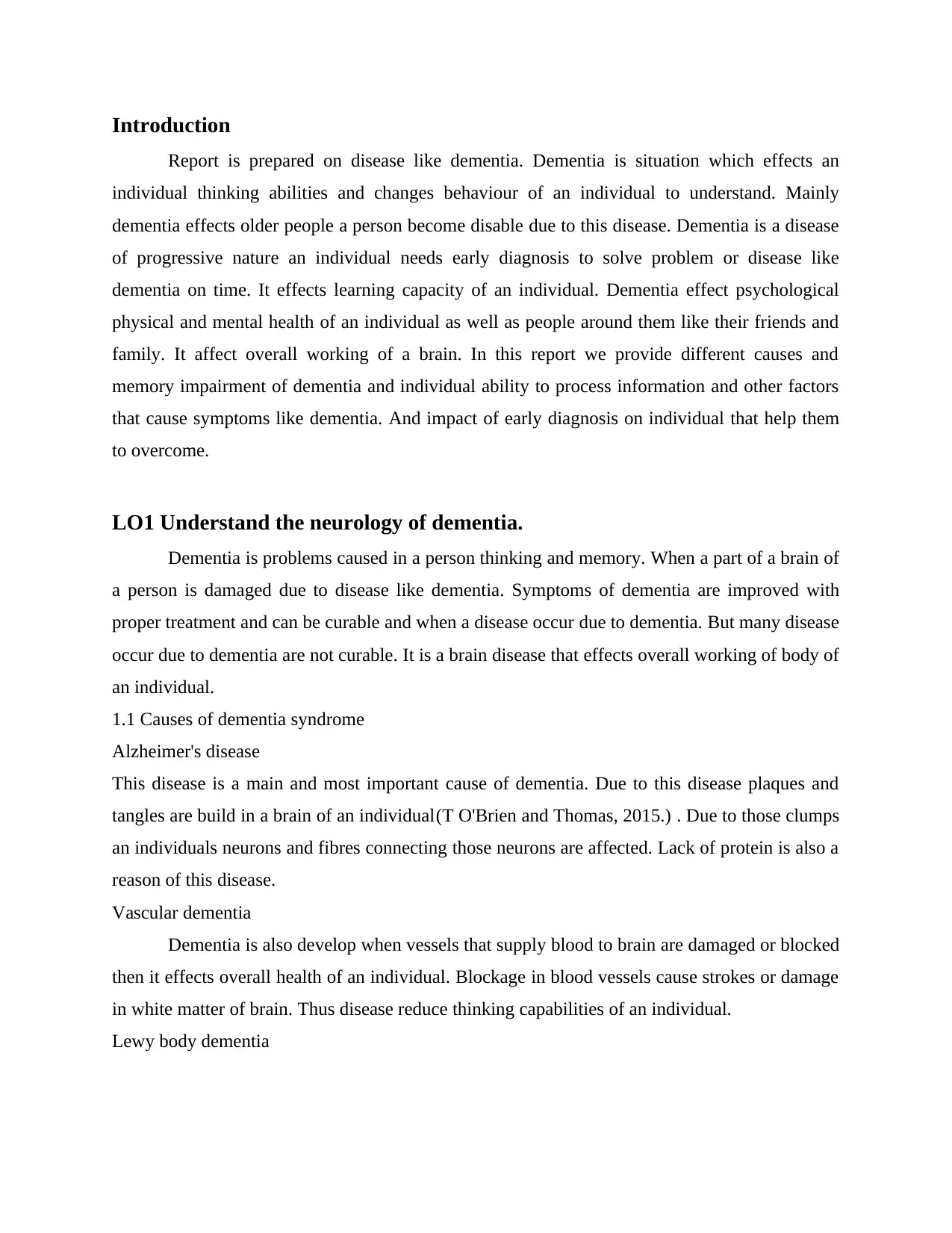
Introduction
Report is prepared on disease like dementia. Dementia is situation which effects an
individual thinking abilities and changes behaviour of an individual to understand. Mainly
dementia effects older people a person become disable due to this disease. Dementia is a disease
of progressive nature an individual needs early diagnosis to solve problem or disease like
dementia on time. It effects learning capacity of an individual. Dementia effect psychological
physical and mental health of an individual as well as people around them like their friends and
family. It affect overall working of a brain. In this report we provide different causes and
memory impairment of dementia and individual ability to process information and other factors
that cause symptoms like dementia. And impact of early diagnosis on individual that help them
to overcome.
LO1 Understand the neurology of dementia.
Dementia is problems caused in a person thinking and memory. When a part of a brain of
a person is damaged due to disease like dementia. Symptoms of dementia are improved with
proper treatment and can be curable and when a disease occur due to dementia. But many disease
occur due to dementia are not curable. It is a brain disease that effects overall working of body of
an individual.
1.1 Causes of dementia syndrome
Alzheimer's disease
This disease is a main and most important cause of dementia. Due to this disease plaques and
tangles are build in a brain of an individual(T O'Brien and Thomas, 2015.) . Due to those clumps
an individuals neurons and fibres connecting those neurons are affected. Lack of protein is also a
reason of this disease.
Vascular dementia
Dementia is also develop when vessels that supply blood to brain are damaged or blocked
then it effects overall health of an individual. Blockage in blood vessels cause strokes or damage
in white matter of brain. Thus disease reduce thinking capabilities of an individual.
Lewy body dementia
Report is prepared on disease like dementia. Dementia is situation which effects an
individual thinking abilities and changes behaviour of an individual to understand. Mainly
dementia effects older people a person become disable due to this disease. Dementia is a disease
of progressive nature an individual needs early diagnosis to solve problem or disease like
dementia on time. It effects learning capacity of an individual. Dementia effect psychological
physical and mental health of an individual as well as people around them like their friends and
family. It affect overall working of a brain. In this report we provide different causes and
memory impairment of dementia and individual ability to process information and other factors
that cause symptoms like dementia. And impact of early diagnosis on individual that help them
to overcome.
LO1 Understand the neurology of dementia.
Dementia is problems caused in a person thinking and memory. When a part of a brain of
a person is damaged due to disease like dementia. Symptoms of dementia are improved with
proper treatment and can be curable and when a disease occur due to dementia. But many disease
occur due to dementia are not curable. It is a brain disease that effects overall working of body of
an individual.
1.1 Causes of dementia syndrome
Alzheimer's disease
This disease is a main and most important cause of dementia. Due to this disease plaques and
tangles are build in a brain of an individual(T O'Brien and Thomas, 2015.) . Due to those clumps
an individuals neurons and fibres connecting those neurons are affected. Lack of protein is also a
reason of this disease.
Vascular dementia
Dementia is also develop when vessels that supply blood to brain are damaged or blocked
then it effects overall health of an individual. Blockage in blood vessels cause strokes or damage
in white matter of brain. Thus disease reduce thinking capabilities of an individual.
Lewy body dementia
⊘ This is a preview!⊘
Do you want full access?
Subscribe today to unlock all pages.

Trusted by 1+ million students worldwide
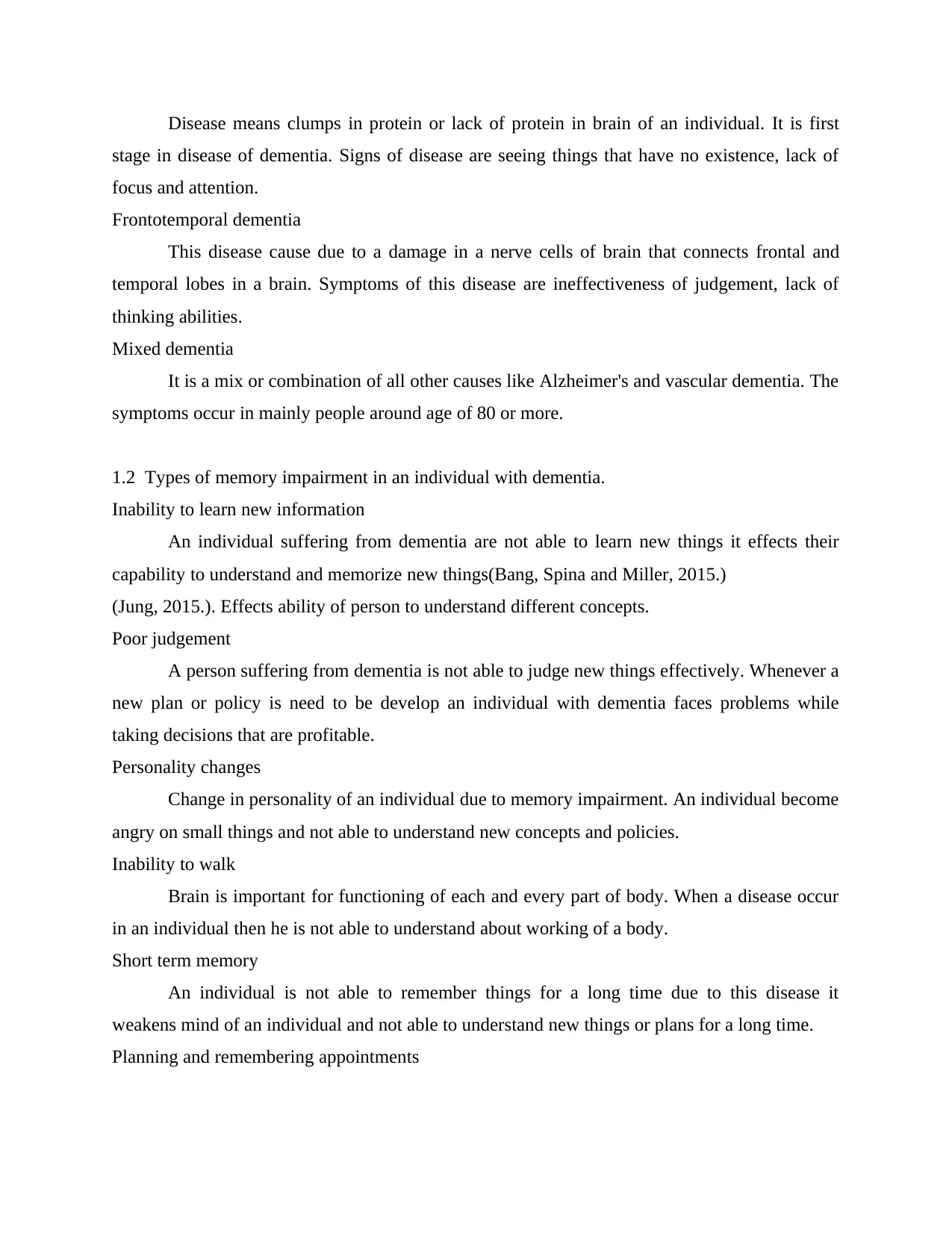
Disease means clumps in protein or lack of protein in brain of an individual. It is first
stage in disease of dementia. Signs of disease are seeing things that have no existence, lack of
focus and attention.
Frontotemporal dementia
This disease cause due to a damage in a nerve cells of brain that connects frontal and
temporal lobes in a brain. Symptoms of this disease are ineffectiveness of judgement, lack of
thinking abilities.
Mixed dementia
It is a mix or combination of all other causes like Alzheimer's and vascular dementia. The
symptoms occur in mainly people around age of 80 or more.
1.2 Types of memory impairment in an individual with dementia.
Inability to learn new information
An individual suffering from dementia are not able to learn new things it effects their
capability to understand and memorize new things(Bang, Spina and Miller, 2015.)
(Jung, 2015.). Effects ability of person to understand different concepts.
Poor judgement
A person suffering from dementia is not able to judge new things effectively. Whenever a
new plan or policy is need to be develop an individual with dementia faces problems while
taking decisions that are profitable.
Personality changes
Change in personality of an individual due to memory impairment. An individual become
angry on small things and not able to understand new concepts and policies.
Inability to walk
Brain is important for functioning of each and every part of body. When a disease occur
in an individual then he is not able to understand about working of a body.
Short term memory
An individual is not able to remember things for a long time due to this disease it
weakens mind of an individual and not able to understand new things or plans for a long time.
Planning and remembering appointments
stage in disease of dementia. Signs of disease are seeing things that have no existence, lack of
focus and attention.
Frontotemporal dementia
This disease cause due to a damage in a nerve cells of brain that connects frontal and
temporal lobes in a brain. Symptoms of this disease are ineffectiveness of judgement, lack of
thinking abilities.
Mixed dementia
It is a mix or combination of all other causes like Alzheimer's and vascular dementia. The
symptoms occur in mainly people around age of 80 or more.
1.2 Types of memory impairment in an individual with dementia.
Inability to learn new information
An individual suffering from dementia are not able to learn new things it effects their
capability to understand and memorize new things(Bang, Spina and Miller, 2015.)
(Jung, 2015.). Effects ability of person to understand different concepts.
Poor judgement
A person suffering from dementia is not able to judge new things effectively. Whenever a
new plan or policy is need to be develop an individual with dementia faces problems while
taking decisions that are profitable.
Personality changes
Change in personality of an individual due to memory impairment. An individual become
angry on small things and not able to understand new concepts and policies.
Inability to walk
Brain is important for functioning of each and every part of body. When a disease occur
in an individual then he is not able to understand about working of a body.
Short term memory
An individual is not able to remember things for a long time due to this disease it
weakens mind of an individual and not able to understand new things or plans for a long time.
Planning and remembering appointments
Paraphrase This Document
Need a fresh take? Get an instant paraphrase of this document with our AI Paraphraser
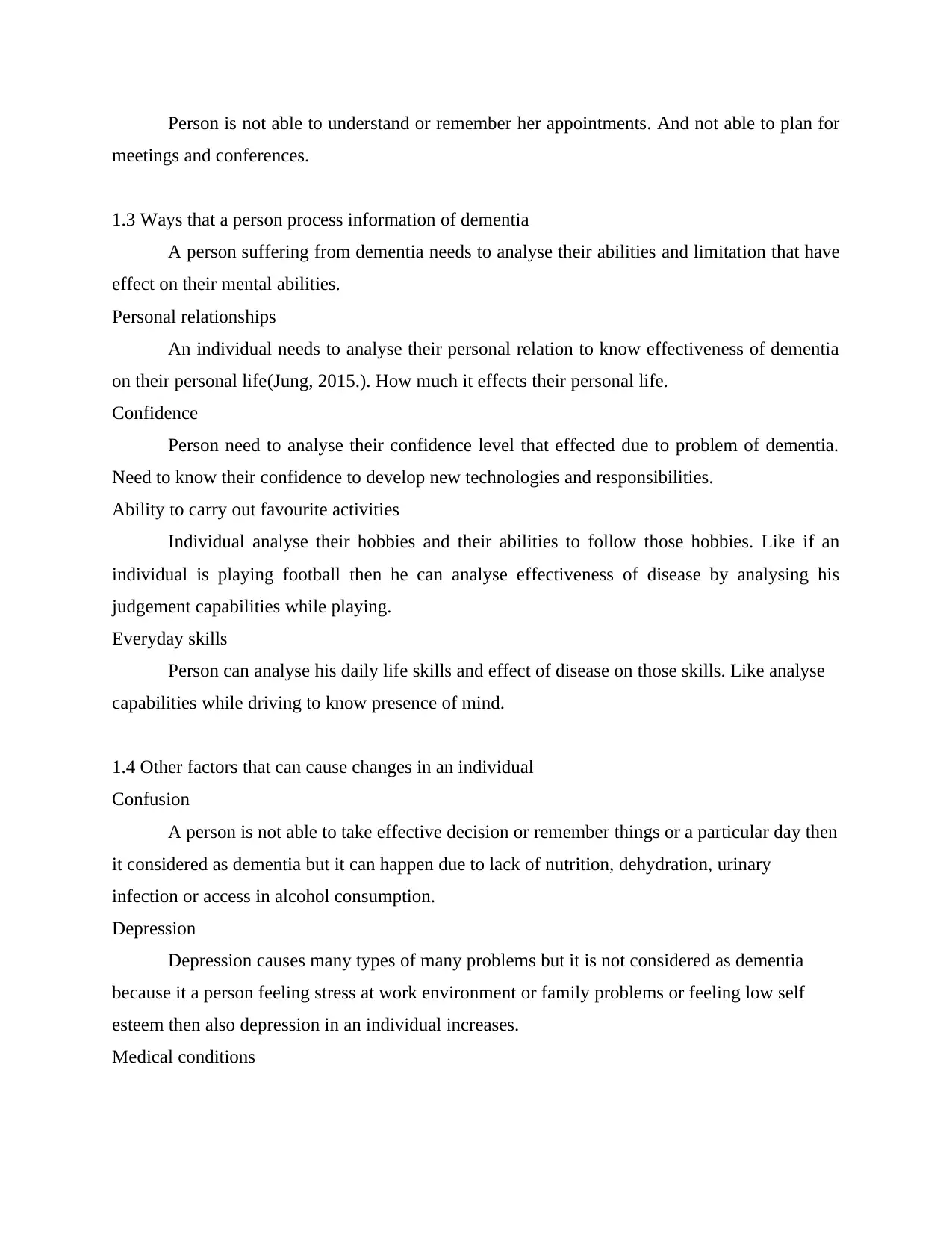
Person is not able to understand or remember her appointments. And not able to plan for
meetings and conferences.
1.3 Ways that a person process information of dementia
A person suffering from dementia needs to analyse their abilities and limitation that have
effect on their mental abilities.
Personal relationships
An individual needs to analyse their personal relation to know effectiveness of dementia
on their personal life(Jung, 2015.). How much it effects their personal life.
Confidence
Person need to analyse their confidence level that effected due to problem of dementia.
Need to know their confidence to develop new technologies and responsibilities.
Ability to carry out favourite activities
Individual analyse their hobbies and their abilities to follow those hobbies. Like if an
individual is playing football then he can analyse effectiveness of disease by analysing his
judgement capabilities while playing.
Everyday skills
Person can analyse his daily life skills and effect of disease on those skills. Like analyse
capabilities while driving to know presence of mind.
1.4 Other factors that can cause changes in an individual
Confusion
A person is not able to take effective decision or remember things or a particular day then
it considered as dementia but it can happen due to lack of nutrition, dehydration, urinary
infection or access in alcohol consumption.
Depression
Depression causes many types of many problems but it is not considered as dementia
because it a person feeling stress at work environment or family problems or feeling low self
esteem then also depression in an individual increases.
Medical conditions
meetings and conferences.
1.3 Ways that a person process information of dementia
A person suffering from dementia needs to analyse their abilities and limitation that have
effect on their mental abilities.
Personal relationships
An individual needs to analyse their personal relation to know effectiveness of dementia
on their personal life(Jung, 2015.). How much it effects their personal life.
Confidence
Person need to analyse their confidence level that effected due to problem of dementia.
Need to know their confidence to develop new technologies and responsibilities.
Ability to carry out favourite activities
Individual analyse their hobbies and their abilities to follow those hobbies. Like if an
individual is playing football then he can analyse effectiveness of disease by analysing his
judgement capabilities while playing.
Everyday skills
Person can analyse his daily life skills and effect of disease on those skills. Like analyse
capabilities while driving to know presence of mind.
1.4 Other factors that can cause changes in an individual
Confusion
A person is not able to take effective decision or remember things or a particular day then
it considered as dementia but it can happen due to lack of nutrition, dehydration, urinary
infection or access in alcohol consumption.
Depression
Depression causes many types of many problems but it is not considered as dementia
because it a person feeling stress at work environment or family problems or feeling low self
esteem then also depression in an individual increases.
Medical conditions
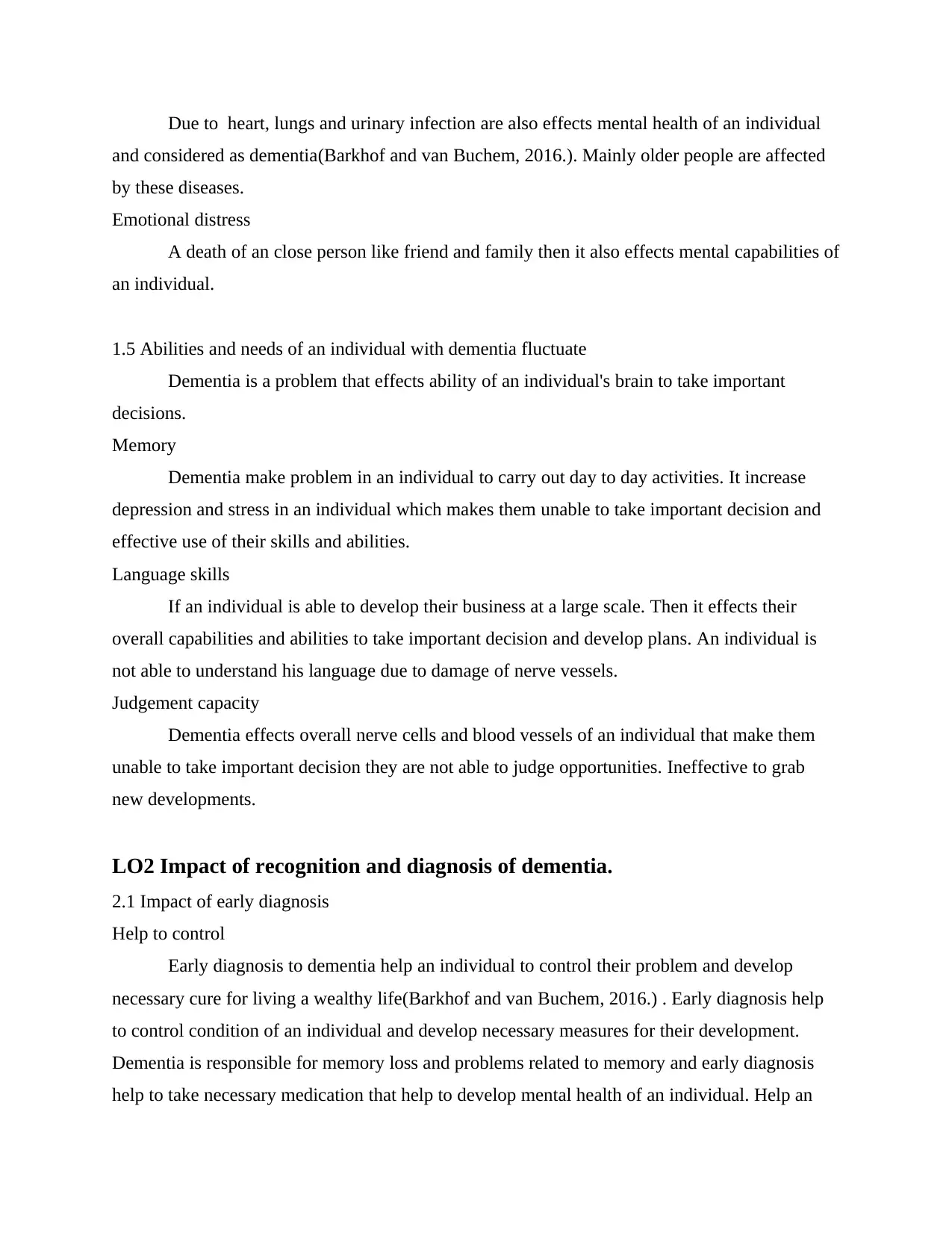
Due to heart, lungs and urinary infection are also effects mental health of an individual
and considered as dementia(Barkhof and van Buchem, 2016.). Mainly older people are affected
by these diseases.
Emotional distress
A death of an close person like friend and family then it also effects mental capabilities of
an individual.
1.5 Abilities and needs of an individual with dementia fluctuate
Dementia is a problem that effects ability of an individual's brain to take important
decisions.
Memory
Dementia make problem in an individual to carry out day to day activities. It increase
depression and stress in an individual which makes them unable to take important decision and
effective use of their skills and abilities.
Language skills
If an individual is able to develop their business at a large scale. Then it effects their
overall capabilities and abilities to take important decision and develop plans. An individual is
not able to understand his language due to damage of nerve vessels.
Judgement capacity
Dementia effects overall nerve cells and blood vessels of an individual that make them
unable to take important decision they are not able to judge opportunities. Ineffective to grab
new developments.
LO2 Impact of recognition and diagnosis of dementia.
2.1 Impact of early diagnosis
Help to control
Early diagnosis to dementia help an individual to control their problem and develop
necessary cure for living a wealthy life(Barkhof and van Buchem, 2016.) . Early diagnosis help
to control condition of an individual and develop necessary measures for their development.
Dementia is responsible for memory loss and problems related to memory and early diagnosis
help to take necessary medication that help to develop mental health of an individual. Help an
and considered as dementia(Barkhof and van Buchem, 2016.). Mainly older people are affected
by these diseases.
Emotional distress
A death of an close person like friend and family then it also effects mental capabilities of
an individual.
1.5 Abilities and needs of an individual with dementia fluctuate
Dementia is a problem that effects ability of an individual's brain to take important
decisions.
Memory
Dementia make problem in an individual to carry out day to day activities. It increase
depression and stress in an individual which makes them unable to take important decision and
effective use of their skills and abilities.
Language skills
If an individual is able to develop their business at a large scale. Then it effects their
overall capabilities and abilities to take important decision and develop plans. An individual is
not able to understand his language due to damage of nerve vessels.
Judgement capacity
Dementia effects overall nerve cells and blood vessels of an individual that make them
unable to take important decision they are not able to judge opportunities. Ineffective to grab
new developments.
LO2 Impact of recognition and diagnosis of dementia.
2.1 Impact of early diagnosis
Help to control
Early diagnosis to dementia help an individual to control their problem and develop
necessary cure for living a wealthy life(Barkhof and van Buchem, 2016.) . Early diagnosis help
to control condition of an individual and develop necessary measures for their development.
Dementia is responsible for memory loss and problems related to memory and early diagnosis
help to take necessary medication that help to develop mental health of an individual. Help an
⊘ This is a preview!⊘
Do you want full access?
Subscribe today to unlock all pages.

Trusted by 1+ million students worldwide
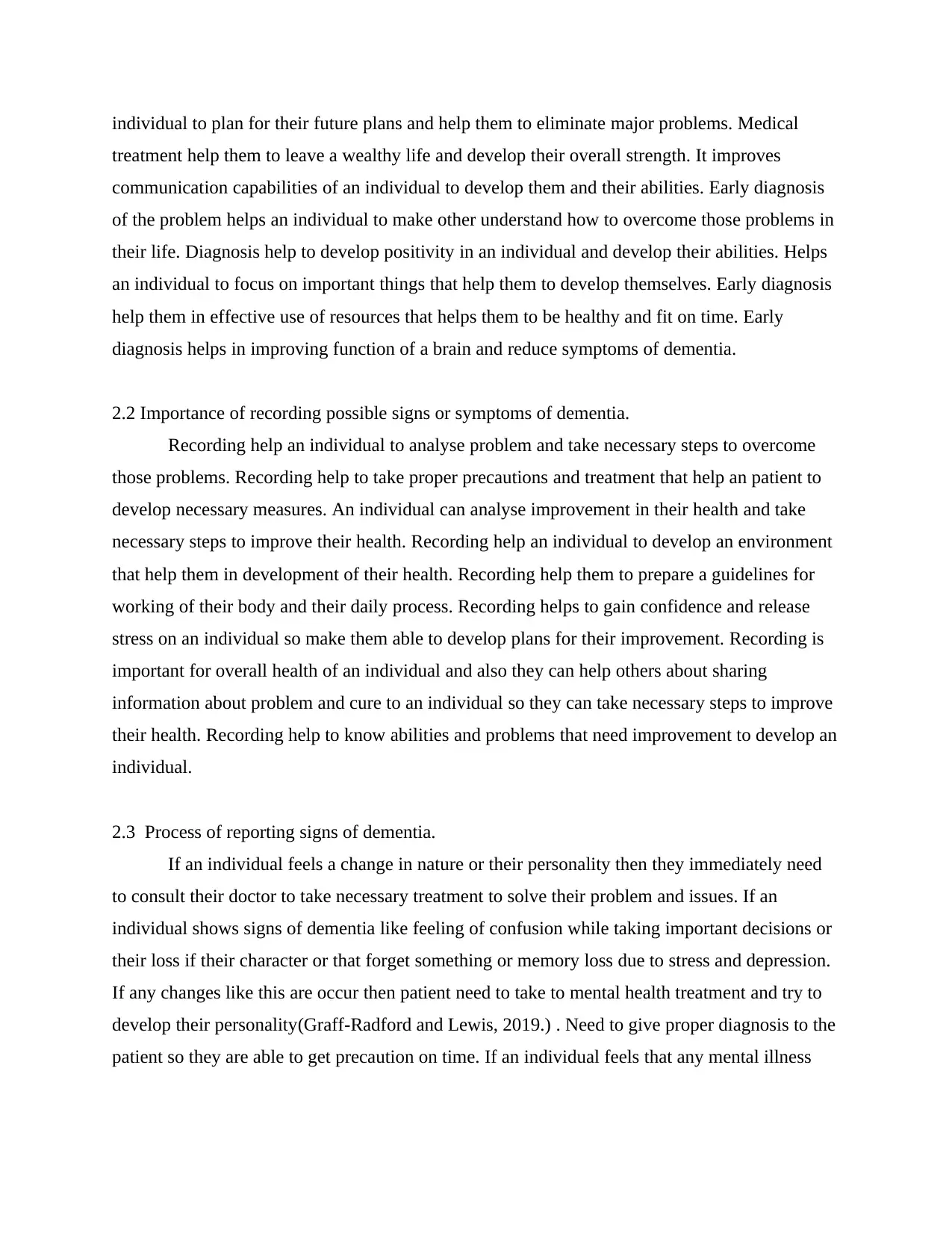
individual to plan for their future plans and help them to eliminate major problems. Medical
treatment help them to leave a wealthy life and develop their overall strength. It improves
communication capabilities of an individual to develop them and their abilities. Early diagnosis
of the problem helps an individual to make other understand how to overcome those problems in
their life. Diagnosis help to develop positivity in an individual and develop their abilities. Helps
an individual to focus on important things that help them to develop themselves. Early diagnosis
help them in effective use of resources that helps them to be healthy and fit on time. Early
diagnosis helps in improving function of a brain and reduce symptoms of dementia.
2.2 Importance of recording possible signs or symptoms of dementia.
Recording help an individual to analyse problem and take necessary steps to overcome
those problems. Recording help to take proper precautions and treatment that help an patient to
develop necessary measures. An individual can analyse improvement in their health and take
necessary steps to improve their health. Recording help an individual to develop an environment
that help them in development of their health. Recording help them to prepare a guidelines for
working of their body and their daily process. Recording helps to gain confidence and release
stress on an individual so make them able to develop plans for their improvement. Recording is
important for overall health of an individual and also they can help others about sharing
information about problem and cure to an individual so they can take necessary steps to improve
their health. Recording help to know abilities and problems that need improvement to develop an
individual.
2.3 Process of reporting signs of dementia.
If an individual feels a change in nature or their personality then they immediately need
to consult their doctor to take necessary treatment to solve their problem and issues. If an
individual shows signs of dementia like feeling of confusion while taking important decisions or
their loss if their character or that forget something or memory loss due to stress and depression.
If any changes like this are occur then patient need to take to mental health treatment and try to
develop their personality(Graff-Radford and Lewis, 2019.) . Need to give proper diagnosis to the
patient so they are able to get precaution on time. If an individual feels that any mental illness
treatment help them to leave a wealthy life and develop their overall strength. It improves
communication capabilities of an individual to develop them and their abilities. Early diagnosis
of the problem helps an individual to make other understand how to overcome those problems in
their life. Diagnosis help to develop positivity in an individual and develop their abilities. Helps
an individual to focus on important things that help them to develop themselves. Early diagnosis
help them in effective use of resources that helps them to be healthy and fit on time. Early
diagnosis helps in improving function of a brain and reduce symptoms of dementia.
2.2 Importance of recording possible signs or symptoms of dementia.
Recording help an individual to analyse problem and take necessary steps to overcome
those problems. Recording help to take proper precautions and treatment that help an patient to
develop necessary measures. An individual can analyse improvement in their health and take
necessary steps to improve their health. Recording help an individual to develop an environment
that help them in development of their health. Recording help them to prepare a guidelines for
working of their body and their daily process. Recording helps to gain confidence and release
stress on an individual so make them able to develop plans for their improvement. Recording is
important for overall health of an individual and also they can help others about sharing
information about problem and cure to an individual so they can take necessary steps to improve
their health. Recording help to know abilities and problems that need improvement to develop an
individual.
2.3 Process of reporting signs of dementia.
If an individual feels a change in nature or their personality then they immediately need
to consult their doctor to take necessary treatment to solve their problem and issues. If an
individual shows signs of dementia like feeling of confusion while taking important decisions or
their loss if their character or that forget something or memory loss due to stress and depression.
If any changes like this are occur then patient need to take to mental health treatment and try to
develop their personality(Graff-Radford and Lewis, 2019.) . Need to give proper diagnosis to the
patient so they are able to get precaution on time. If an individual feels that any mental illness
Paraphrase This Document
Need a fresh take? Get an instant paraphrase of this document with our AI Paraphraser
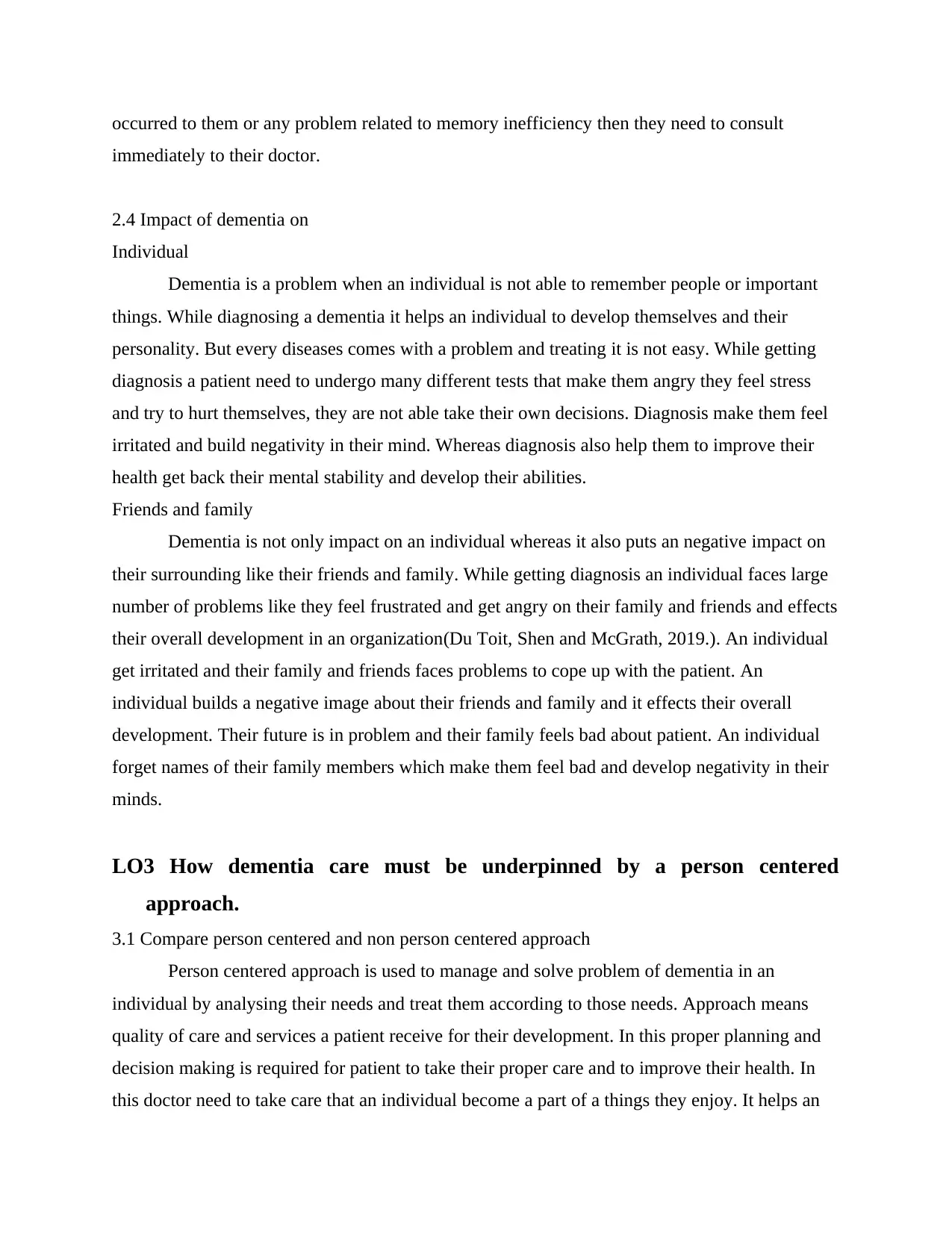
occurred to them or any problem related to memory inefficiency then they need to consult
immediately to their doctor.
2.4 Impact of dementia on
Individual
Dementia is a problem when an individual is not able to remember people or important
things. While diagnosing a dementia it helps an individual to develop themselves and their
personality. But every diseases comes with a problem and treating it is not easy. While getting
diagnosis a patient need to undergo many different tests that make them angry they feel stress
and try to hurt themselves, they are not able take their own decisions. Diagnosis make them feel
irritated and build negativity in their mind. Whereas diagnosis also help them to improve their
health get back their mental stability and develop their abilities.
Friends and family
Dementia is not only impact on an individual whereas it also puts an negative impact on
their surrounding like their friends and family. While getting diagnosis an individual faces large
number of problems like they feel frustrated and get angry on their family and friends and effects
their overall development in an organization(Du Toit, Shen and McGrath, 2019.). An individual
get irritated and their family and friends faces problems to cope up with the patient. An
individual builds a negative image about their friends and family and it effects their overall
development. Their future is in problem and their family feels bad about patient. An individual
forget names of their family members which make them feel bad and develop negativity in their
minds.
LO3 How dementia care must be underpinned by a person centered
approach.
3.1 Compare person centered and non person centered approach
Person centered approach is used to manage and solve problem of dementia in an
individual by analysing their needs and treat them according to those needs. Approach means
quality of care and services a patient receive for their development. In this proper planning and
decision making is required for patient to take their proper care and to improve their health. In
this doctor need to take care that an individual become a part of a things they enjoy. It helps an
immediately to their doctor.
2.4 Impact of dementia on
Individual
Dementia is a problem when an individual is not able to remember people or important
things. While diagnosing a dementia it helps an individual to develop themselves and their
personality. But every diseases comes with a problem and treating it is not easy. While getting
diagnosis a patient need to undergo many different tests that make them angry they feel stress
and try to hurt themselves, they are not able take their own decisions. Diagnosis make them feel
irritated and build negativity in their mind. Whereas diagnosis also help them to improve their
health get back their mental stability and develop their abilities.
Friends and family
Dementia is not only impact on an individual whereas it also puts an negative impact on
their surrounding like their friends and family. While getting diagnosis an individual faces large
number of problems like they feel frustrated and get angry on their family and friends and effects
their overall development in an organization(Du Toit, Shen and McGrath, 2019.). An individual
get irritated and their family and friends faces problems to cope up with the patient. An
individual builds a negative image about their friends and family and it effects their overall
development. Their future is in problem and their family feels bad about patient. An individual
forget names of their family members which make them feel bad and develop negativity in their
minds.
LO3 How dementia care must be underpinned by a person centered
approach.
3.1 Compare person centered and non person centered approach
Person centered approach is used to manage and solve problem of dementia in an
individual by analysing their needs and treat them according to those needs. Approach means
quality of care and services a patient receive for their development. In this proper planning and
decision making is required for patient to take their proper care and to improve their health. In
this doctor need to take care that an individual become a part of a things they enjoy. It helps an
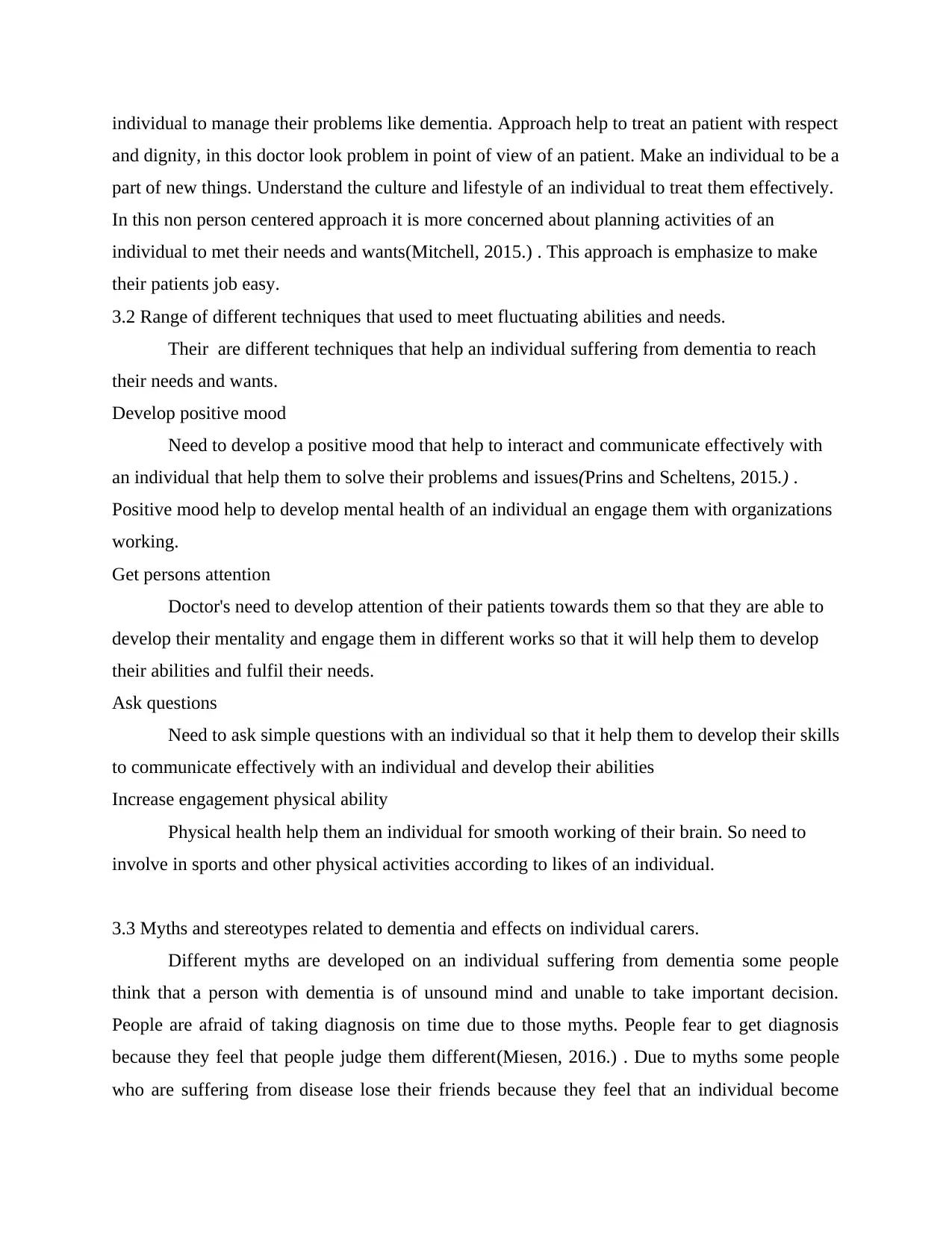
individual to manage their problems like dementia. Approach help to treat an patient with respect
and dignity, in this doctor look problem in point of view of an patient. Make an individual to be a
part of new things. Understand the culture and lifestyle of an individual to treat them effectively.
In this non person centered approach it is more concerned about planning activities of an
individual to met their needs and wants(Mitchell, 2015.) . This approach is emphasize to make
their patients job easy.
3.2 Range of different techniques that used to meet fluctuating abilities and needs.
Their are different techniques that help an individual suffering from dementia to reach
their needs and wants.
Develop positive mood
Need to develop a positive mood that help to interact and communicate effectively with
an individual that help them to solve their problems and issues(Prins and Scheltens, 2015.) .
Positive mood help to develop mental health of an individual an engage them with organizations
working.
Get persons attention
Doctor's need to develop attention of their patients towards them so that they are able to
develop their mentality and engage them in different works so that it will help them to develop
their abilities and fulfil their needs.
Ask questions
Need to ask simple questions with an individual so that it help them to develop their skills
to communicate effectively with an individual and develop their abilities
Increase engagement physical ability
Physical health help them an individual for smooth working of their brain. So need to
involve in sports and other physical activities according to likes of an individual.
3.3 Myths and stereotypes related to dementia and effects on individual carers.
Different myths are developed on an individual suffering from dementia some people
think that a person with dementia is of unsound mind and unable to take important decision.
People are afraid of taking diagnosis on time due to those myths. People fear to get diagnosis
because they feel that people judge them different(Miesen, 2016.) . Due to myths some people
who are suffering from disease lose their friends because they feel that an individual become
and dignity, in this doctor look problem in point of view of an patient. Make an individual to be a
part of new things. Understand the culture and lifestyle of an individual to treat them effectively.
In this non person centered approach it is more concerned about planning activities of an
individual to met their needs and wants(Mitchell, 2015.) . This approach is emphasize to make
their patients job easy.
3.2 Range of different techniques that used to meet fluctuating abilities and needs.
Their are different techniques that help an individual suffering from dementia to reach
their needs and wants.
Develop positive mood
Need to develop a positive mood that help to interact and communicate effectively with
an individual that help them to solve their problems and issues(Prins and Scheltens, 2015.) .
Positive mood help to develop mental health of an individual an engage them with organizations
working.
Get persons attention
Doctor's need to develop attention of their patients towards them so that they are able to
develop their mentality and engage them in different works so that it will help them to develop
their abilities and fulfil their needs.
Ask questions
Need to ask simple questions with an individual so that it help them to develop their skills
to communicate effectively with an individual and develop their abilities
Increase engagement physical ability
Physical health help them an individual for smooth working of their brain. So need to
involve in sports and other physical activities according to likes of an individual.
3.3 Myths and stereotypes related to dementia and effects on individual carers.
Different myths are developed on an individual suffering from dementia some people
think that a person with dementia is of unsound mind and unable to take important decision.
People are afraid of taking diagnosis on time due to those myths. People fear to get diagnosis
because they feel that people judge them different(Miesen, 2016.) . Due to myths some people
who are suffering from disease lose their friends because they feel that an individual become
⊘ This is a preview!⊘
Do you want full access?
Subscribe today to unlock all pages.

Trusted by 1+ million students worldwide
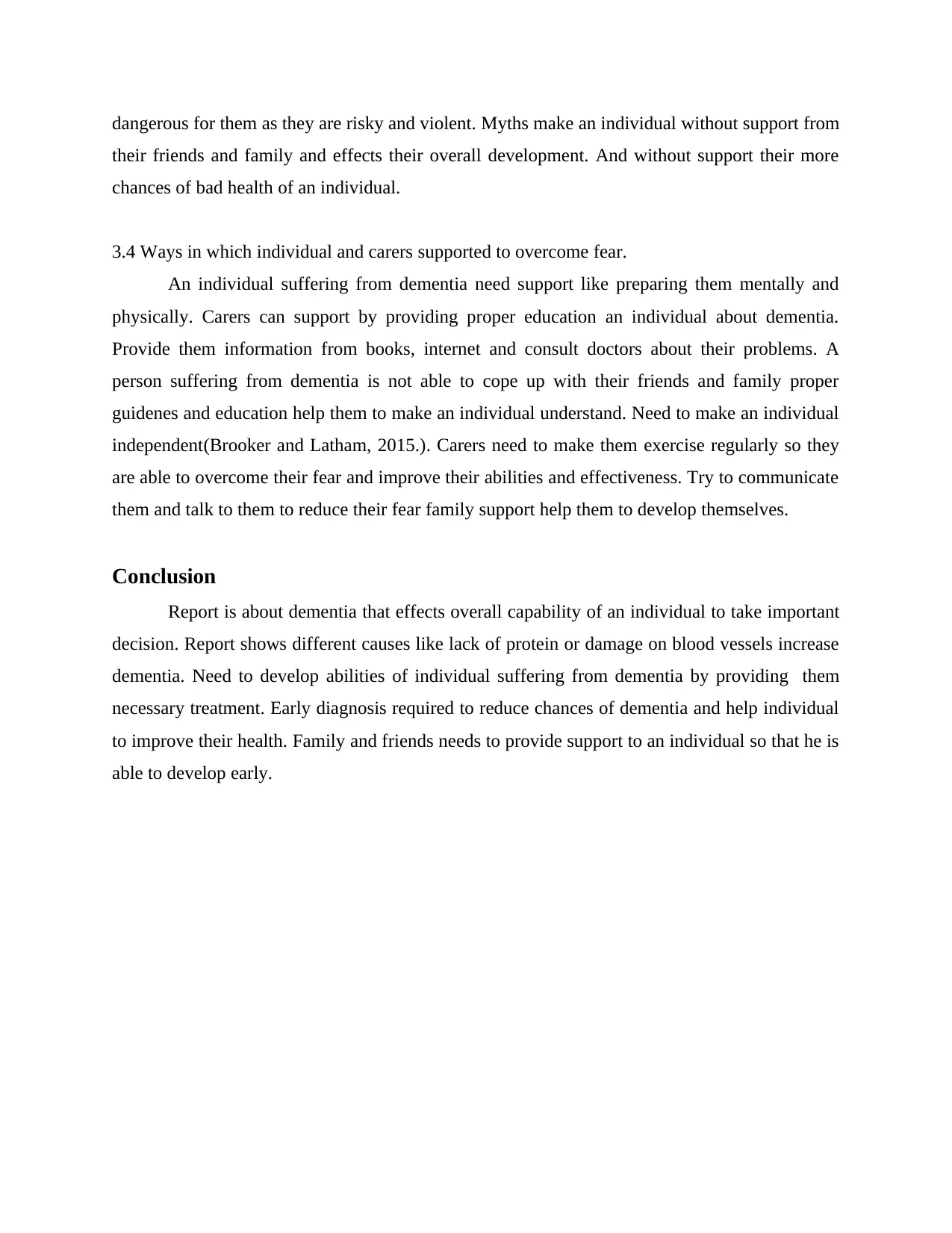
dangerous for them as they are risky and violent. Myths make an individual without support from
their friends and family and effects their overall development. And without support their more
chances of bad health of an individual.
3.4 Ways in which individual and carers supported to overcome fear.
An individual suffering from dementia need support like preparing them mentally and
physically. Carers can support by providing proper education an individual about dementia.
Provide them information from books, internet and consult doctors about their problems. A
person suffering from dementia is not able to cope up with their friends and family proper
guidenes and education help them to make an individual understand. Need to make an individual
independent(Brooker and Latham, 2015.). Carers need to make them exercise regularly so they
are able to overcome their fear and improve their abilities and effectiveness. Try to communicate
them and talk to them to reduce their fear family support help them to develop themselves.
Conclusion
Report is about dementia that effects overall capability of an individual to take important
decision. Report shows different causes like lack of protein or damage on blood vessels increase
dementia. Need to develop abilities of individual suffering from dementia by providing them
necessary treatment. Early diagnosis required to reduce chances of dementia and help individual
to improve their health. Family and friends needs to provide support to an individual so that he is
able to develop early.
their friends and family and effects their overall development. And without support their more
chances of bad health of an individual.
3.4 Ways in which individual and carers supported to overcome fear.
An individual suffering from dementia need support like preparing them mentally and
physically. Carers can support by providing proper education an individual about dementia.
Provide them information from books, internet and consult doctors about their problems. A
person suffering from dementia is not able to cope up with their friends and family proper
guidenes and education help them to make an individual understand. Need to make an individual
independent(Brooker and Latham, 2015.). Carers need to make them exercise regularly so they
are able to overcome their fear and improve their abilities and effectiveness. Try to communicate
them and talk to them to reduce their fear family support help them to develop themselves.
Conclusion
Report is about dementia that effects overall capability of an individual to take important
decision. Report shows different causes like lack of protein or damage on blood vessels increase
dementia. Need to develop abilities of individual suffering from dementia by providing them
necessary treatment. Early diagnosis required to reduce chances of dementia and help individual
to improve their health. Family and friends needs to provide support to an individual so that he is
able to develop early.
Paraphrase This Document
Need a fresh take? Get an instant paraphrase of this document with our AI Paraphraser
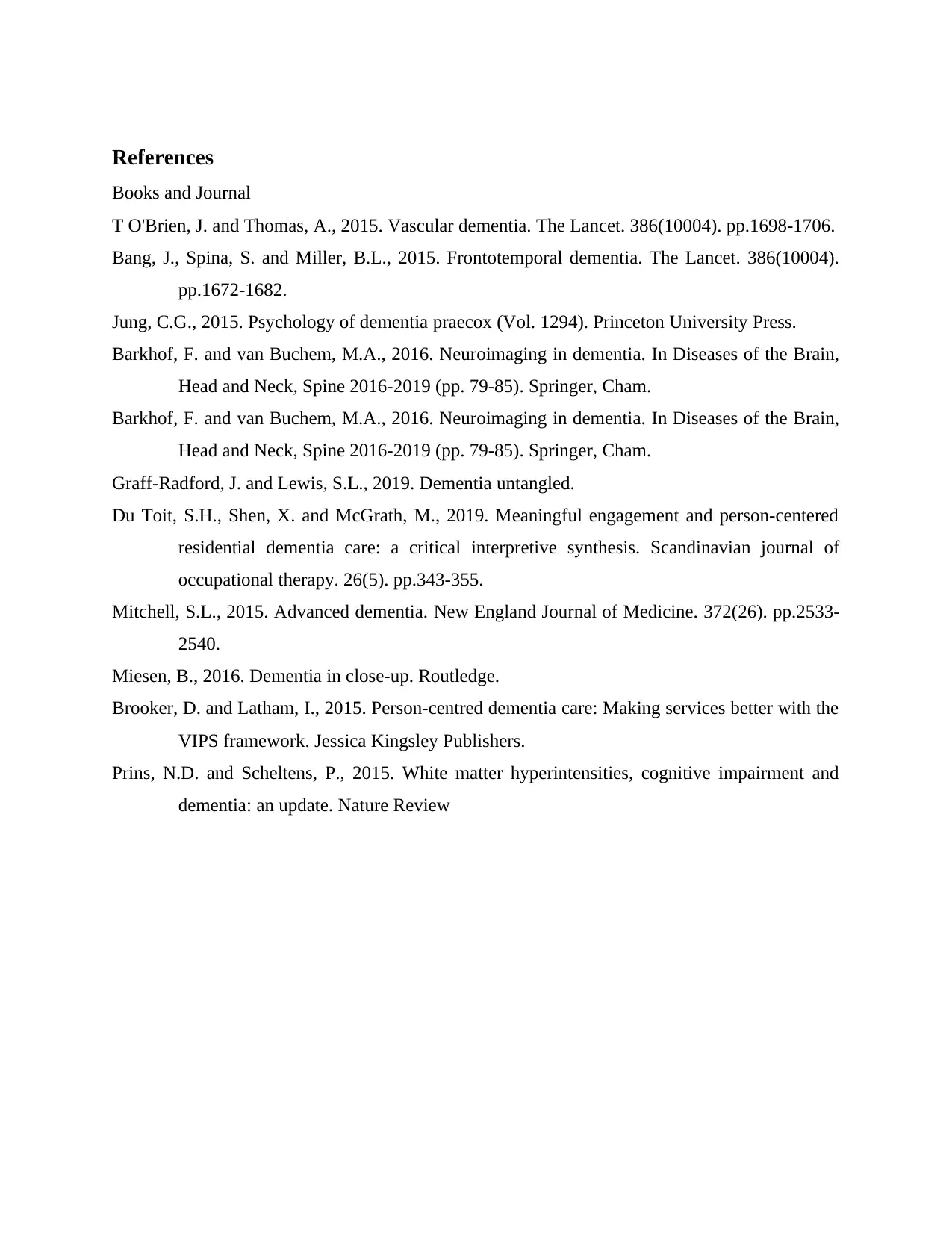
References
Books and Journal
T O'Brien, J. and Thomas, A., 2015. Vascular dementia. The Lancet. 386(10004). pp.1698-1706.
Bang, J., Spina, S. and Miller, B.L., 2015. Frontotemporal dementia. The Lancet. 386(10004).
pp.1672-1682.
Jung, C.G., 2015. Psychology of dementia praecox (Vol. 1294). Princeton University Press.
Barkhof, F. and van Buchem, M.A., 2016. Neuroimaging in dementia. In Diseases of the Brain,
Head and Neck, Spine 2016-2019 (pp. 79-85). Springer, Cham.
Barkhof, F. and van Buchem, M.A., 2016. Neuroimaging in dementia. In Diseases of the Brain,
Head and Neck, Spine 2016-2019 (pp. 79-85). Springer, Cham.
Graff-Radford, J. and Lewis, S.L., 2019. Dementia untangled.
Du Toit, S.H., Shen, X. and McGrath, M., 2019. Meaningful engagement and person-centered
residential dementia care: a critical interpretive synthesis. Scandinavian journal of
occupational therapy. 26(5). pp.343-355.
Mitchell, S.L., 2015. Advanced dementia. New England Journal of Medicine. 372(26). pp.2533-
2540.
Miesen, B., 2016. Dementia in close-up. Routledge.
Brooker, D. and Latham, I., 2015. Person-centred dementia care: Making services better with the
VIPS framework. Jessica Kingsley Publishers.
Prins, N.D. and Scheltens, P., 2015. White matter hyperintensities, cognitive impairment and
dementia: an update. Nature Review
Books and Journal
T O'Brien, J. and Thomas, A., 2015. Vascular dementia. The Lancet. 386(10004). pp.1698-1706.
Bang, J., Spina, S. and Miller, B.L., 2015. Frontotemporal dementia. The Lancet. 386(10004).
pp.1672-1682.
Jung, C.G., 2015. Psychology of dementia praecox (Vol. 1294). Princeton University Press.
Barkhof, F. and van Buchem, M.A., 2016. Neuroimaging in dementia. In Diseases of the Brain,
Head and Neck, Spine 2016-2019 (pp. 79-85). Springer, Cham.
Barkhof, F. and van Buchem, M.A., 2016. Neuroimaging in dementia. In Diseases of the Brain,
Head and Neck, Spine 2016-2019 (pp. 79-85). Springer, Cham.
Graff-Radford, J. and Lewis, S.L., 2019. Dementia untangled.
Du Toit, S.H., Shen, X. and McGrath, M., 2019. Meaningful engagement and person-centered
residential dementia care: a critical interpretive synthesis. Scandinavian journal of
occupational therapy. 26(5). pp.343-355.
Mitchell, S.L., 2015. Advanced dementia. New England Journal of Medicine. 372(26). pp.2533-
2540.
Miesen, B., 2016. Dementia in close-up. Routledge.
Brooker, D. and Latham, I., 2015. Person-centred dementia care: Making services better with the
VIPS framework. Jessica Kingsley Publishers.
Prins, N.D. and Scheltens, P., 2015. White matter hyperintensities, cognitive impairment and
dementia: an update. Nature Review
1 out of 11
Related Documents
Your All-in-One AI-Powered Toolkit for Academic Success.
+13062052269
info@desklib.com
Available 24*7 on WhatsApp / Email
![[object Object]](/_next/static/media/star-bottom.7253800d.svg)
Unlock your academic potential
Copyright © 2020–2026 A2Z Services. All Rights Reserved. Developed and managed by ZUCOL.





